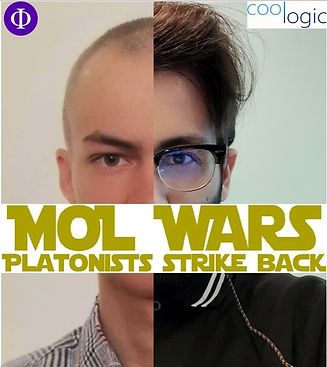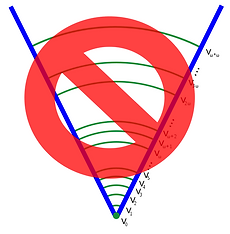Past Talks
MoL Wars: The Academy Strikes Back
Evan Iatrou and Jan Gronwald

In the era of scientism, platonists have gotten used to being the laughing stock of the philosophy of mathematics community. Postulating the existence of non-spatiotemporal objects and "mystic" ways of knowing true propositions about those objects seems more like Greek mythology than possible metaphysical and epistemic truths. Among the popular alternatives to Platonism that ground mathematical ontology & epistemology to the "real" world is that of Brouwer's Intuitionism, a position grounded on our perception of time and hence, by default, spatiotemporal.
In the first ever joint event between the Cool Logic and Φ-math organisers and in the first ever Cool Logic debate, Evan will strike back against intuitionists by presenting evidence from experimental cognitive psychology that falsifies the foundation of their position and that does justice to Plato. On the opposition, Jan will defend his Master - Brouwer - by arguing that Evan's arguments are nothing but another lame excuse by platonists to live in fairyland.
Proof-Theoretical Solutions to the Paradoxes of Naive Set Theory
Valentin Müller
Abstract: Among the variety of possible solutions to the paradoxes of naive set theory, suggestions made by the mathematician Heinrich Behmann (1891--1970) appear to be particularly remarkable (even though they are commonly unknown today). From Behmann’s point of view, the paradoxes do not represent proper contradictions, but rather “meaningless” expressions that can be avoided by a simple and purely syntactical criterion. The main goal of my talk is to provide a partial confirmation of Behmann’s view. To this end, I will present a new system of natural deduction strongly inspired by Behmann’s analysis of the set-theoretical paradoxes. It will be demonstrated that a certain subclass of the proofs in our system has the normalization property: every deduction in this class may be transformed into a “cut-free” proof. As a corollary, it then follows that the propositional fragment of our system is in fact consistent. In the last part of the talk, I will discuss some open problems and closely related approaches such as the system of “Fitch-Prawitz Set Theory”.
A Derivation of Falsum from the ZFC Axioms

Newly discovered manuscripts of Kurt Godel have brought a shocking discovery to light: the ZFC axioms, upon which the whole of modern mathematics is based, are inconsistent. Our speaker today, Dr Percival Rank of the Institute for Advanced Studies, will be taking us blow-by-blow through Godel's derivation of Falsum. He will then suggest some alternative axiomatic theories to base mathematics upon, such as Heyting arithmetic, higher-higher-order homotopy type theory, and Moses' Ten Commandments. He'll conclude with a discussion of how this result bears upon the question of whether the machine could ever be a mind.
Writing algorithms to recompose the music of Arvo Pärt
Bas Cornellisen

Arvo Pärt is one of the most popular contemporary composers. In fact, according to one count, he was the most performed contemporary composer in eight successive years from 2011 to 2018. Who would have expected that from algorithmically composed music? Indeed, that is how Pärt arguably composes: his style, known as tintanibulli, heavily relies on the use simple mathematical procedures. They can regulate everything from the structure of a piece to the duration of individual notes. To better understand that process, we analyze and formalize Pärt's composition Summa. The algorithm we implement almost completely reconstructs the work: it outputs a musical score that matches the original in over 93% of the notes. In fact, as a result of dependencies between the notes, only 3.5% of the notes really remains to be corrected. Our work not only demonstrates that Pärt's approach to composition is deeply formal, it also invites new algorithmic compositions in his style.
Towards a Logic of Explanation
Bobby Tosswill

Are you tired of getting confused listening to logic lectures? Has anyone ever looked at you like you’re speaking Martian when you try to explain what you’re studying here at the MoL? Do you find yourself reading a paper over multiple times, just checking that it's actually words written there, and not just gibberish pretending to be intelligent? Then you’re in the right place!
In Cool Logic’s first talk of 2022 next Friday, 4 Feb, our very own @Bobby Tosswill will take us on a journey to investigate what understanding is, how we communicate complex ideas, and what exactly makes bad lectures quite so bad. Drawing on research from cognitive science, the philosophies of understanding, mathematical practice, and so much more, Bobby will propose a cognitively-plausible logic of explanation, and demonstrate how it can help us make sense of how we make sense of things. So join us February the 4th, 17.00, SP904 D1.111 – you’ll laugh, you’ll cry, and you might even just learn something!